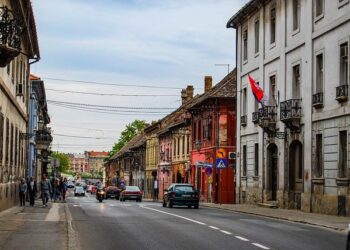Serbia has taken a significant step toward expanding its luxury hospitality sector by passing legislation to facilitate the construction of a Trump-branded hotel in its capital, Belgrade. The new law, approved by the Serbian parliament, paves the way for the high-profile project linked to former U.S. President Donald Trump’s business empire. This development marks a notable moment in Serbia’s ongoing efforts to attract international investment and boost its tourism industry, while also drawing global attention to the intersection of politics and business interests in the region.
Serbia Approves Controversial Legislation to Facilitate Trump Hotel Development in Belgrade
The Serbian government has endorsed a highly debated bill that paves the way for the construction of a new luxury hotel bearing the Trump brand in Belgrade’s city center. The legislation grants special concessions and land-use rights specifically tailored to accelerate the project’s approval process. Critics argue the move raises concerns about transparency and the potential favoritism shown towards foreign investors linked to prominent political figures. Supporters, however, emphasize the expected boost to local tourism and foreign direct investment that the hotel development promises.
Key features of the approved legislation include:
- Land allocation in a prime district with relaxed zoning restrictions
- Tax exemptions granted for the initial five years of operation
- Streamlined permitting processes to minimize bureaucratic delays
- Increased state oversight to monitor project compliance
The decision has reignited debate over Serbia’s approach to economic development and foreign partnerships, spotlighting the ongoing balance between economic growth ambitions and regulatory integrity.
| Aspect | Details |
|---|---|
| Location | Belgrade City Center |
| Project Sponsor | Official Trump Organization Affiliate |
| Expected Completion | 2027 |
| Investment Value | ‚ā¨120 million |
Economic Implications and Political Reactions Surrounding the Trump Hotel Project
The announcement of the Trump hotel project in Belgrade has sparked a wave of economic expectations and political debate across Serbia. Economists predict the development could generate significant employment opportunities during both construction and operational phases, potentially boosting tourism and attracting foreign investment. The government is positioning the venture as a catalyst for modernizing Belgrade’s hospitality sector, with estimated direct investment exceeding ‚ā¨200 million. Supporters argue that the project aligns with Serbia’s strategic goals of enhancing its international profile and economic infrastructure, while skeptics caution about the risks of over-dependence on foreign-branded luxury ventures amid volatile global markets.
Political reactions have been equally polarized. The ruling party has embraced the project as a symbol of Serbia’s growing economic openness and strategic cooperation with international partners. Conversely, opposition voices question the transparency of the tender process and call for clearer guarantees on how projected benefits will be distributed locally. Concerns over possible favoritism and environmental impacts have also surfaced, prompting calls for more stringent regulatory oversight. Below is an overview of key political positions:
- Government: Emphasizes investment inflow, job creation, and tourism boost.
- Opposition: Demands transparency, equitable local benefits, and environmental safeguards.
- Civil Society: Advocates for public consultation and accountability in urban development.
| Stakeholder | Primary Concern | Expected Benefit |
|---|---|---|
| Government | Economic growth, employment | ‚ā¨200M investment, 1,500 jobs |
| Opposition | Transparency, fairness | Equitable regional development |
| Environmental Groups | Sustainability | Strict eco-regulations |
Recommendations for Transparency and Sustainable Urban Planning in International Real Estate Deals
Enhancing transparency is paramount in high-profile international real estate projects like the newly approved Trump hotel in Belgrade. Governments and private developers must commit to open disclosure practices at every stage-from land acquisition to construction and financing. This includes publicly accessible contracts, clear procurement processes, and regular updates on environmental and social impact assessments. By establishing a transparent framework, local communities and stakeholders can better understand the project’s implications and hold involved parties accountable.
Sustainable urban planning should be integrated to ensure long-term benefits that extend beyond immediate economic gains. This means prioritizing green spaces, efficient energy use, and alignment with Belgrade’s existing infrastructure and urban development plans. Below is a simple checklist for best practices in sustainable urban planning tailored for international investments:
- Conduct comprehensive environmental impact assessments
- Engage local communities and incorporate their feedback
- Implement renewable energy systems within new developments
- Ensure accessibility and integration with public transport
- Promote mixed-use spaces to foster social cohesion
| Aspect | Recommendation | Benefit |
|---|---|---|
| Transparency | Public contract disclosures | Reduces corruption risks |
| Urban Planning | Green infrastructure integration | Improves air quality & livability |
| Community Engagement | Local stakeholder meetings | Increases public support & trust |
Insights and Conclusions
As Serbia moves forward with the legislation enabling the construction of a Trump hotel in Belgrade, attention will now turn to the project’s economic impact and its broader geopolitical implications. The development marks a significant moment in Serbia’s efforts to attract international investment and raise its profile on the global stage, even as it navigates complex regional dynamics. Stakeholders and observers alike will be closely watching how this high-profile venture shapes the city’s landscape and Serbia’s future relations with international business and political actors.
















